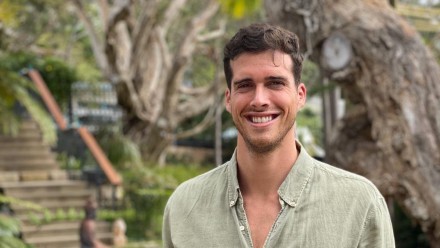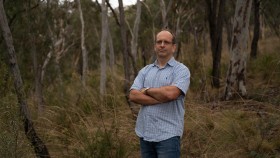Gaining the tools to make change, with the Master of Climate Change
After completing his undergraduate degree in commerce, Tommy Buckingham commenced his career in the technology sector across sales, partnerships and operations. Life was by all measures, comfortable.
However, Tommy was becoming increasingly concerned about the impacts of climate change. Like many, he wanted to make a positive impact, but wasn’t sure how best to do this.
“I wasn’t clear about where we need to focus our attention and time to start to solve the many challenges we face as a result of climate change,” he said.
In a stroke of serendipity, a close friend and ANU graduate introduced Tommy to Master of Climate Change course convenor, Dr Rebecca Colvin.
“Dr Colvin explained that the program would allow me to gain a scientific overview of climate change and build a deep understanding of where the greatest opportunities to solve the biggest climate challenges lie. I immediately knew it was the right program for me,” Tommy said.
Tommy notes that the strengths of the Master of Climate Change include its multidisciplinary approach, as well as the research component focussed on corporate net-zero target setting.
“The program explores solutions that are grounded in policy, economics and science but also recognises the politicised and complex nature of climate change,” he said. “It helped me appreciate that the problems associated with climate change are varied and will require many different and often imperfect solutions.”
When asked about the most enjoyable part of the program, Tommy couldn’t choose just one thing. The quality of lecturers, balanced content and his fellow students all contributed to his positive experience.
“The calibre of lecturers and professors in the Masters of Climate Change was exceptional. To learn and collaborate with leading global experts in their respective fields was a huge privilege,” said Tommy
“My fellow students also came from such an array of interesting backgrounds - both professionally and geographically,” said Tommy.
“The threats and impacts of climate change in Australia are very different to those in, say, India or in the Philippines. Learning from other international students who were already leaders in government or in the private sector added such a valuable dimension to my study,” he said.
Now in his final year, Tommy was able to complete part of his degree online and part in-person and spoke highly of both experiences.
“The first half of my masters was online and the second half was in person. Both were fantastic. Online study was extremely well organised and delivered. The teaching staff were also masters at getting students to have the confidence and enthusiasm to turn themselves off “mute” and engage with course materials.”
Upon completion of his degree, Tommy is hoping to return to the technology sector but with a focus on decarbonisation in the industry.
“My aim is to join a technology company focusing on helping businesses decarbonise and achieve net zero emissions by bringing transparency to their supply chains,” he said.
“I would not have had the confidence or knowledge to make the leap into this space without the Masters of Climate Change,” said Tommy. “I’m really excited about this next step in my career.”










